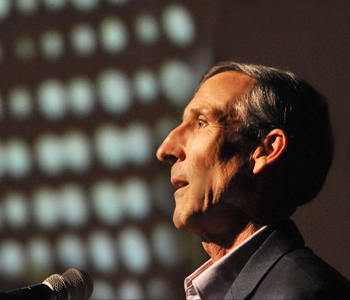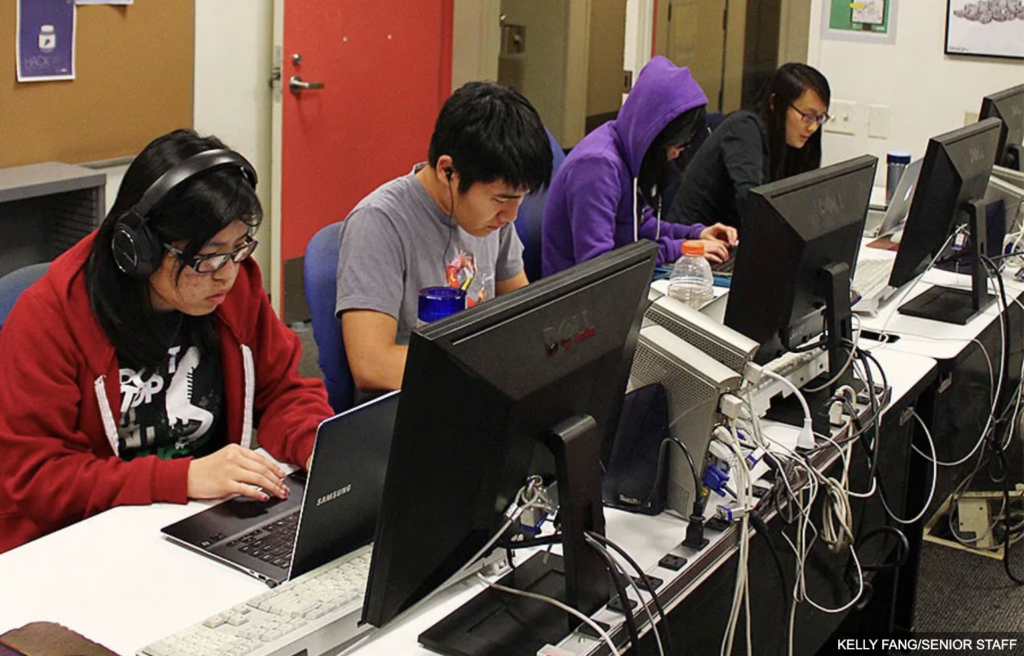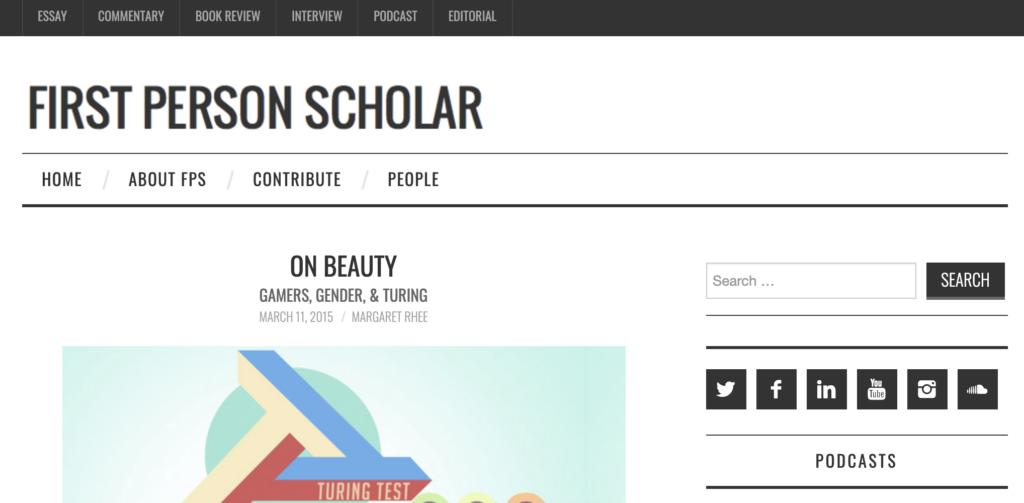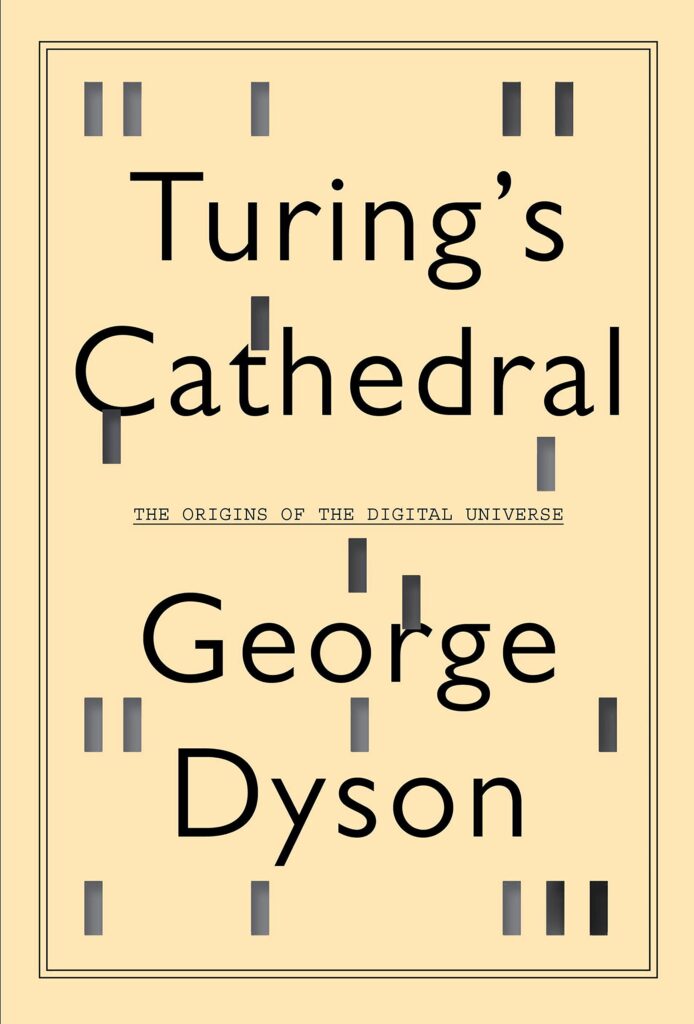
Turing’s Cathedral: The Origins of the Digital Universe
George Dyson
The campus’s annual On the Same Page program was created to welcome new students to Berkeley’s extraordinary intellectual environment. Your 2013-2014 On the Same Page program is entitled The Dawn of the Computer Age.
This year’s featured author is George Dyson, whose new book Turing’s Cathedral describes the strange and remarkable history of the creation of the digital electronic computer. This work was chosen to appeal to students—and faculty—from across the disciplines. What could be more intriguing than the birth and explosion of the digital universe, and the amazing historical context in which it occurred — the Cold War development of the H-bomb, cryptography, molecular genetics, and of the entire concept of what we now call “software”?
We ask that you read Turing’s Cathedral this summer, and prepare yourself to engage actively with the theme once you arrive on campus. Historically speaking, we are still experiencing the dawn of the computer age, and an important goal of this year’s program is to explore the amazing, and perhaps disturbing, things to come as computing becomes ever more pervasive in our lives. Discussions and activities will probe issues such as the impacts of social networking, the “digital divide” among different communities in our society, increasing threats to privacy and confidentiality, virtual worlds, cyber warfare, and the brain-machine interface. All students will be invited to pit themselves against a mystery opponent by participating in a special online version of the “Turing Test,” where the object is to find out whether your partner in conversation is actually a human or a machine, or perhaps even a human pretending to be a machine.
Whether you are interested in tracking the people, the institutions, or the actual computing equipment described in Dyson’s fascinating historical account, our thematic outline of Turing’s Cathedral will help you identify the passages of keenest interest. You will also read about many of the mathematical and scientific aspects of the Dawn of the Computer Age, including the ways in which the development of early computers was interwoven with the development of the modern methods and tools of war, not to mention more benign activities such as numerical weather prediction and modeling evolution. After participating in this year’s On the Same Page program, you will probably never see the iPhone in your pocket or the laptop in your backpack in quite the same way.
Welcome to Berkeley, and welcome to the 2013-14 entering class’s exploration of The Dawn of the Computer Age!
George Dyson
George Dyson is an author, boatbuilder, designer, and historian of technology whose interests have included the development (and redevelopment) of the Aleut kayak (Baidarka, 1986), the evolution of digital computing and telecommunications (Darwin Among the Machines, 1997), and a path not taken into space (Project Orion, 2002). His latest book, Turing’s Cathedral: The Origins of the Digital Universe (2012), illuminates the transition from numbers that mean things to numbers that do things in the aftermath of World War II.
Dyson, who never graduated from high school, managed to avoid formal education (with the exception of one quarter at UC San Diego and one quarter at UC Berkeley) while still producing academic work. His early adventures, contrasted with those of his father, physicist Freeman Dyson, were the subject of Kenneth Brower’s classic 1978 dual biography The Starship and the Canoe.
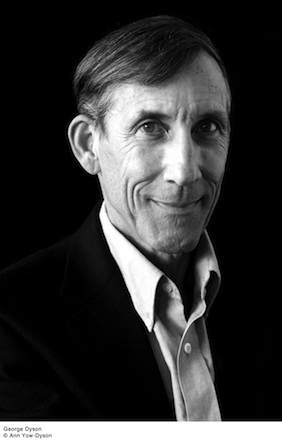
News and Resources
Dawn of digital era comes alive via ‘On the Same Page’
By Barry Bergman, Berkeley News | SEPTEMBER 27, 2013
UC Berkeley aims to stay ahead of the curve in age of tech
BY POOJA MHATRE, Daily Cal Staff | Last updated March 23, 2013
On Beauty: Gamers, Gender, & Turing
Margaret Rhee | March 11, 2015
Events
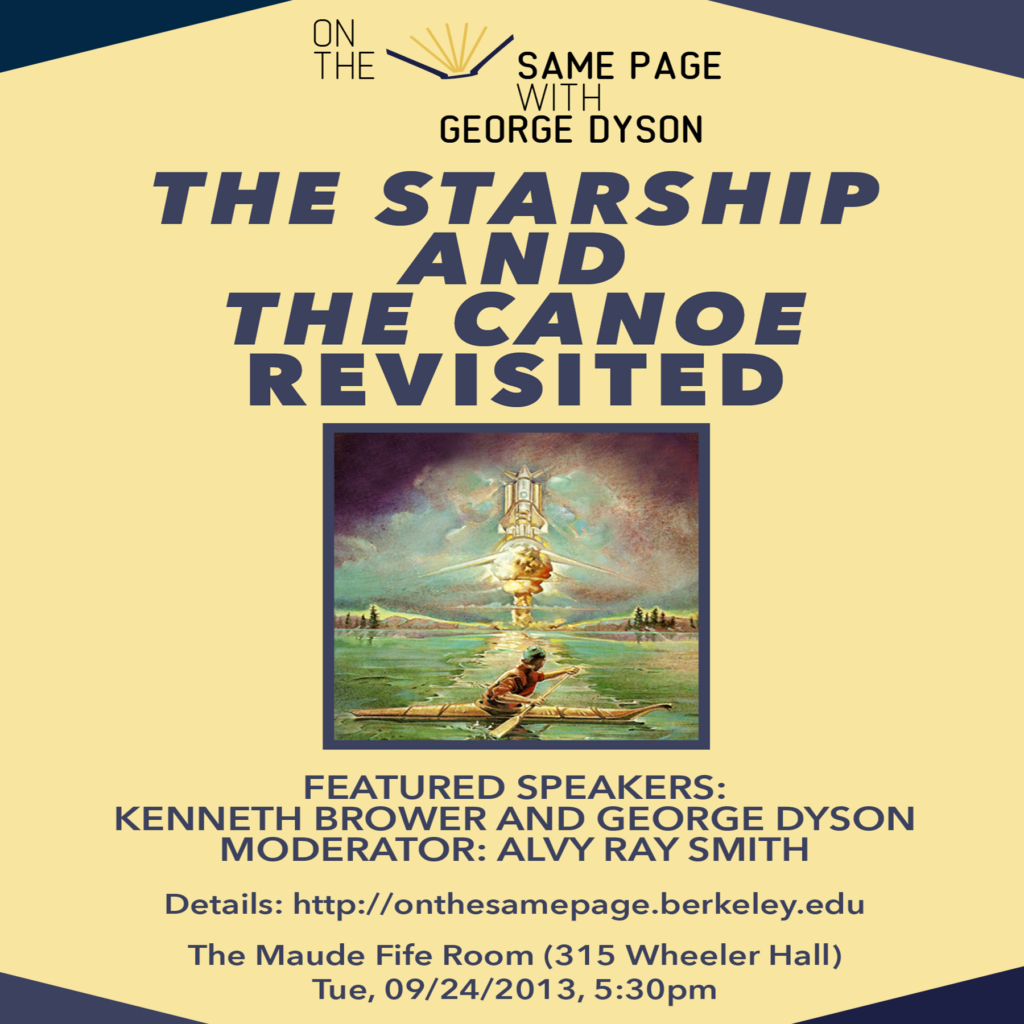
The Starship and The Canoe Revisited
Tue 09/24/2013 – 5:30pm
Maude Fife Room, 315 Wheeler Hall
Featured Speakers: Kenneth Brower and George Dyson
Moderator: Alvy Ray Smith
Thirty-five years ago Kenneth Brower published The Starship and the Canoe, a moving, insightful double biography of astrophysicist Freeman Dyson and his son, our On the Same Page featured author George Dyson. Father and son are alike in their intensity and passion, but chose very different—some may say opposing–arenas in which to enact their brilliance. In the course of writing his book, Brower not only spent weeks canoeing in the wilderness with George Dyson, but also brought the Dysons back together after a period of estrangement. His involvement in their lives adds an unusual personal dimension to the book. In September the author and younger subject of The Starship and the Canoe will be reunited for an informal discussion of their experiences and subsequent insights, with lively moderation by Pixar co-founder Alvy Ray Smith.
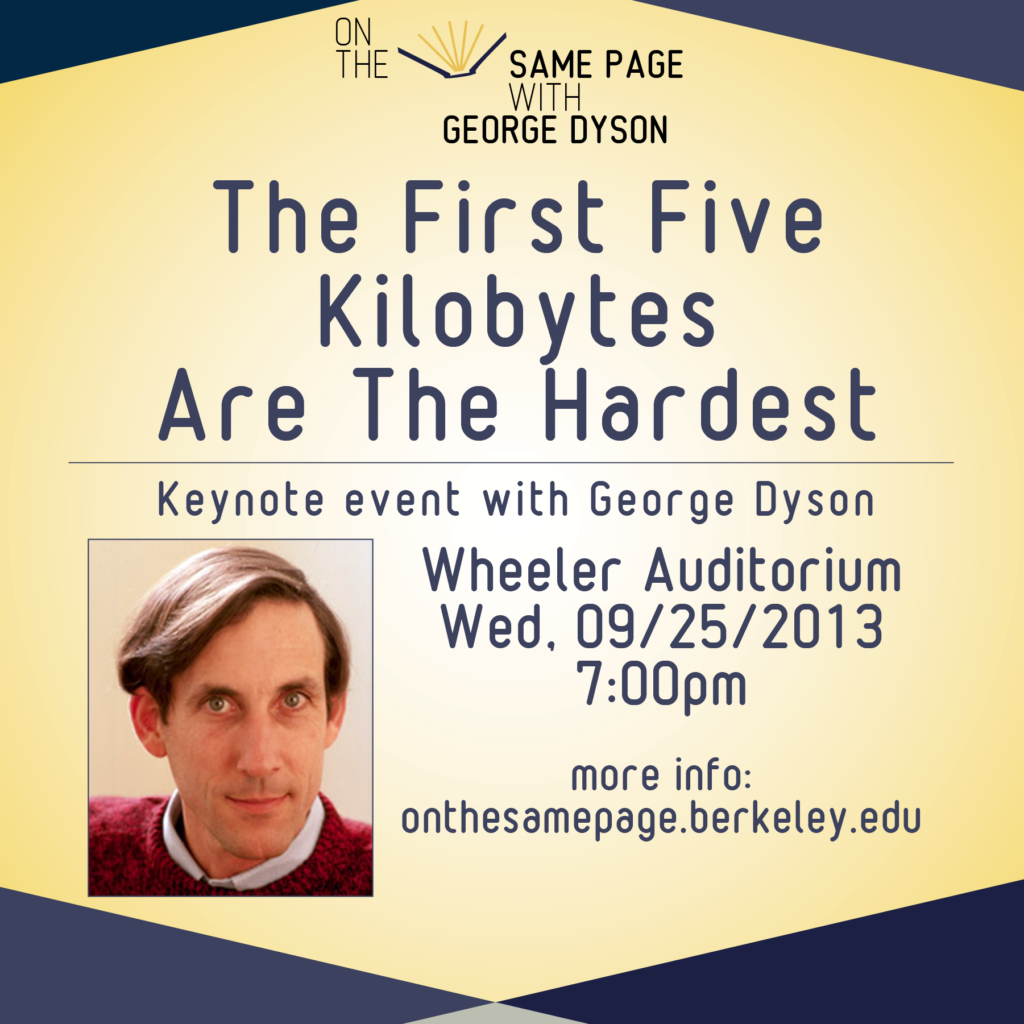
The First Five Kilobytes Are the Hardest
Keynote Event with George Dyson
Wed 09/25/2013 – 7:00pm
Wheeler Auditorium
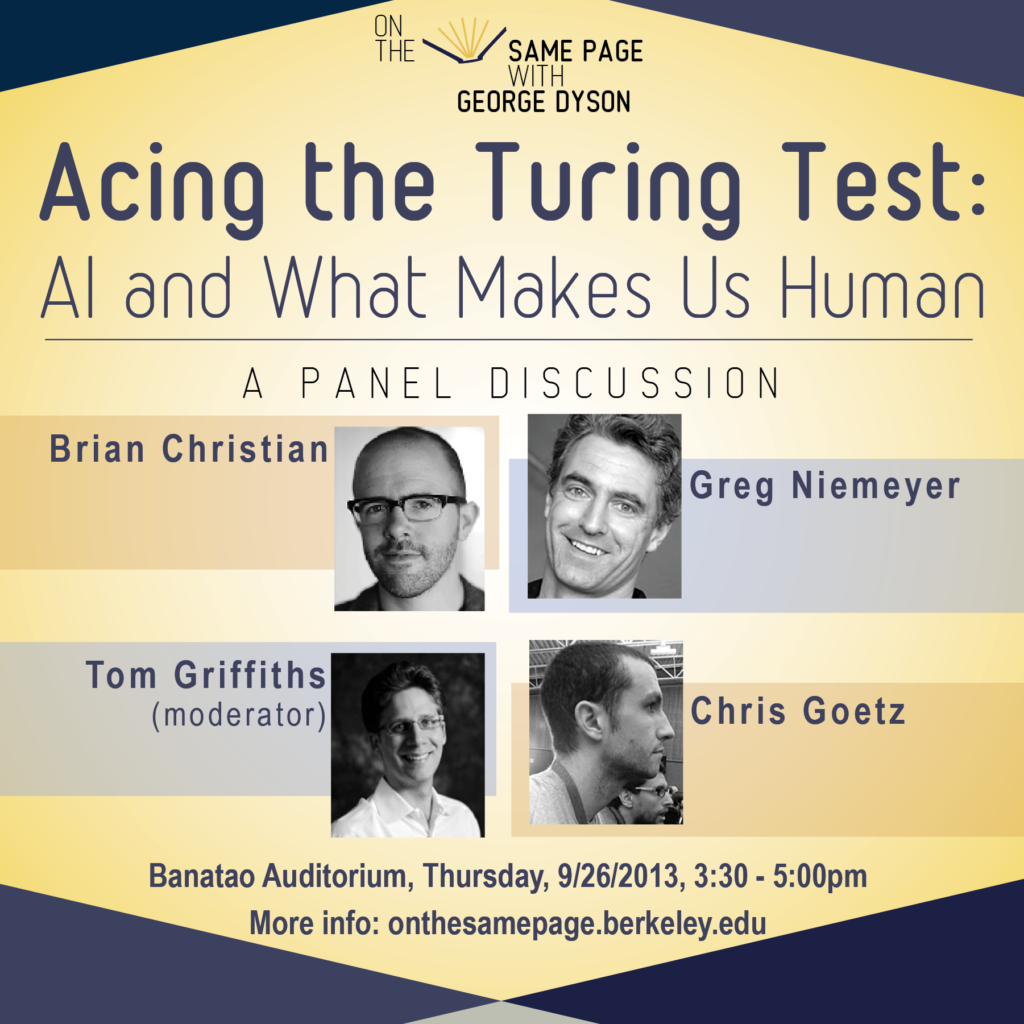
Acing the Turing Test: AI and What Makes Us Human
Thu 09/26/2013 – 3:30pm
Banatao Auditorium
As part of the On the Same Page program, distinguished panelists will discuss the Turing test and how it fosters the exploration of the boundaries between human and artificial intelligence. Panelists will describe the development of Berkeley’s own version of the test, the Turing Test Tournament, and discuss how being a participant could change your perception of what it means to be human.
Panelists:
Grey Niemeyer and Chris Goetz, Berkeley Center for New Media
Brian Christian, author of The Most Human Human: What Artificial Intelligence Teaches Us About Being Alive
Moderator: Tom Griffiths, Director of the Computational Cognitive Science Lab and Institute of Cognitive Brain Sciences
The panel discussion will be followed by an informal reception with refreshments, where attendees can meet and chat with the panelists and other guests.
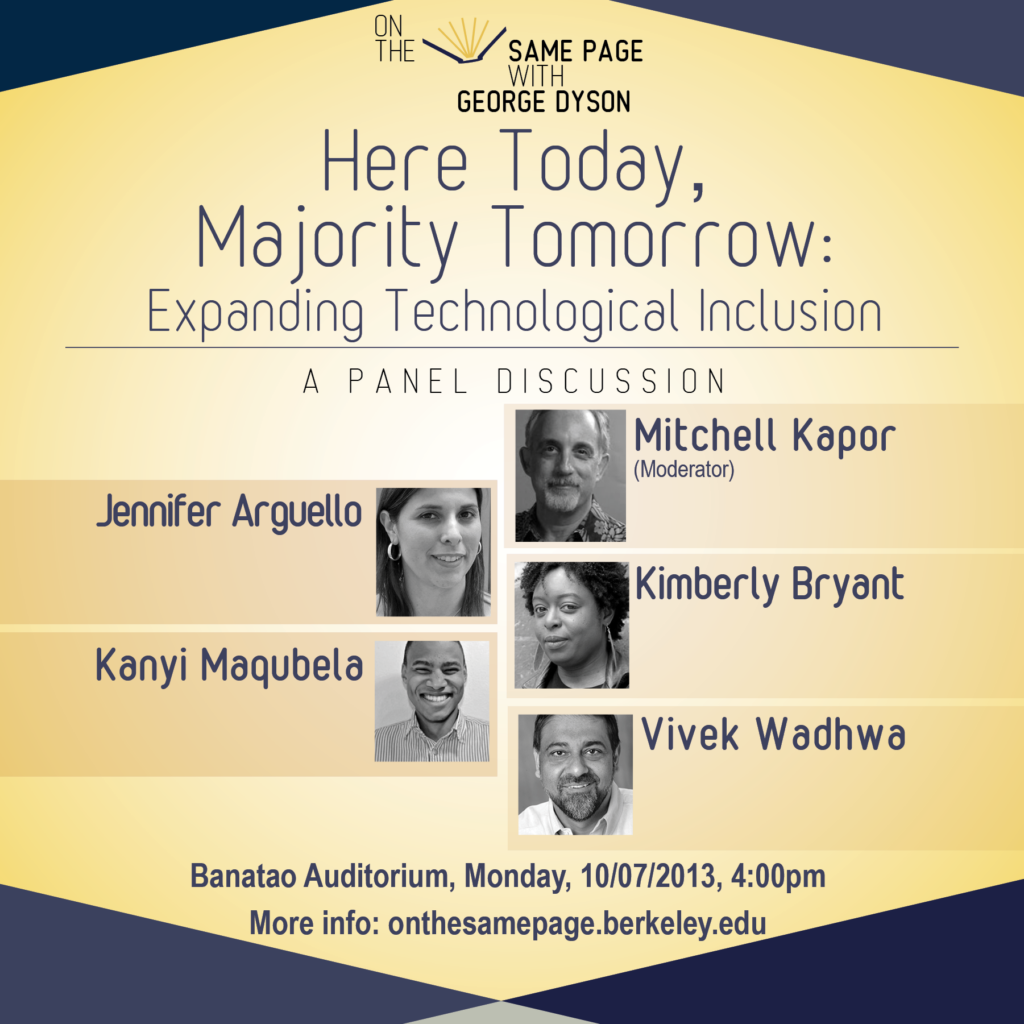
Here Today, Majority Tomorrow: Expanding Technological Inclusion
Mon 10/07/2013 – 4:00pm
Banatao Auditorium
Panelists:
Jennifer Arguello, Executive Director of Latino2
Kimberly Bryant, founder of Black Girls CODE
Kanyi Maqubela, a venture capitalist with the Collaborative Fund
Vivek Wadhwa, academic, researcher, writer and entrepreneur
Moderator: Mitchell Kapor, Co-Chair of the Kapor Center for Social Impact and Partner at Kapor Capital
Technological inclusion is not an issue for some of us; it’s an issue for all of us. California is becoming a “majority minority” state much faster than most people realize, and where California is going the nation overall will soon follow. Technology is the engine that drives the economy, and we are currently experiencing a shortage of skilled professionals for careers in the STEM fields. There is vast untapped potential in the African American and Latino populations, as well as among women of all backgrounds, all of whom are currently woefully under-represented in STEM disciplines and fields and in the tech fields specifically. All of our distinguished panelists are working in innovative and effective ways to close the gap. Attendees should expect to walk away from this panel with both inspiration and some practical ideas for how they too can take action in this vital arena.
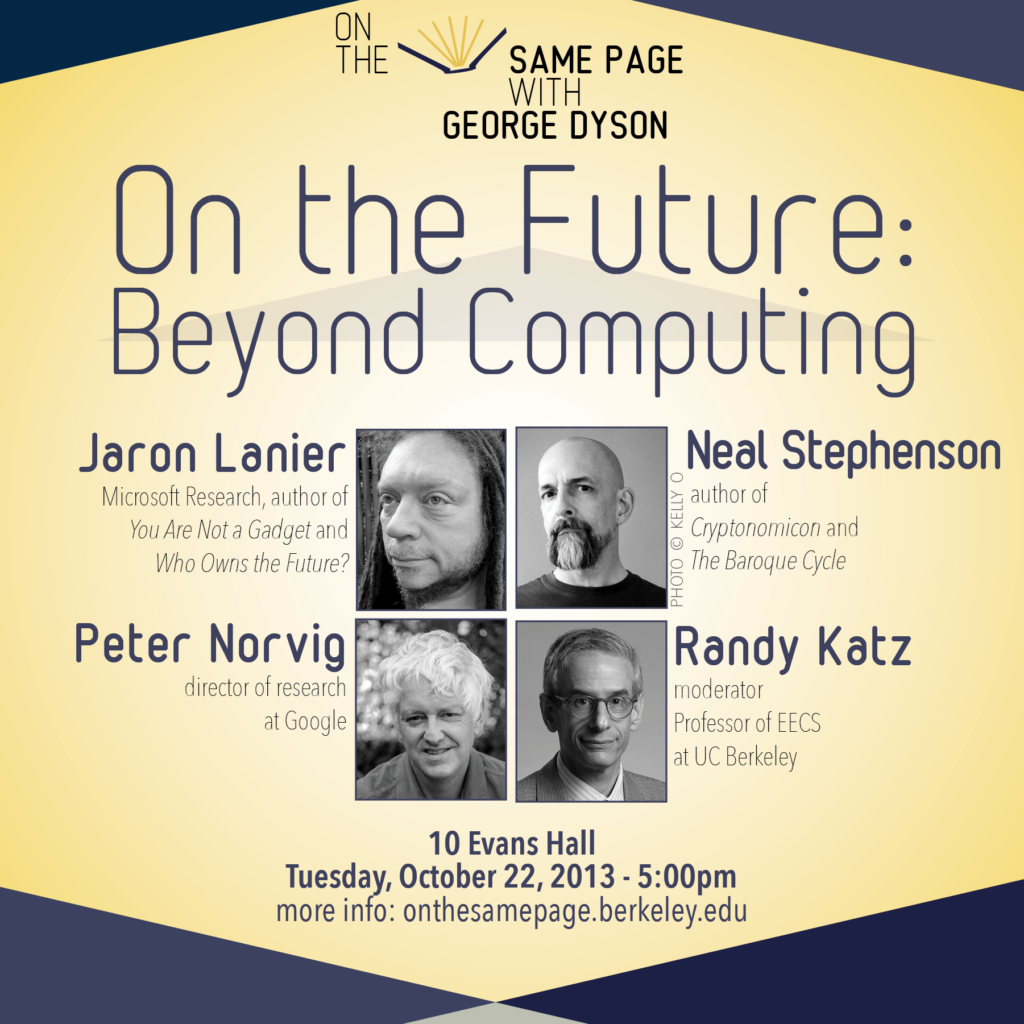
On the Future: Beyond Computing
Tue 10/22/2013 – 5:00pm
10 Evans Hall
Panelists:
Jaron Lanier
Neal Stephenson
Peter Norvig
Moderator: Randy Katz
Staff Book Group
Members of the UC Berkeley staff who would like to read Turing’s Cathedral and discuss it with fellow staff members are invited to join the OTSP Staff Book Group. Led by Alix Schwartz and Rebecca Ulrich, this group will meet every other Thursday beginning July 25, at noon. Specific dates and locations follow:
July 25: 236 Evans
August 8: 236 Evans
August 22: 236 Evans
September 5: 262 Evans (NOTE different location)
September 19, 236 Evans
With this schedule we will complete the book before George Dyson’s keynote event on September 25.
Members are welcome to take advantage of the resources on this website, and to play the Turing Test Tournament (open to anyone with a berkeley.edu email address). Book Group members will receive a complementary copy of Turing’s Cathedral.
As of July 15, the book group is now full. If you would like to be put on a waitlist, please sign up here [form closed].
Dialogues
From September 30 through October 4, faculty members from across the campus will be hosting sessions to discuss various angles on this year’s theme. These “Dialogues with Faculty” are very informal, and all Cal undergrads are welcome. Meeting and interacting with faculty should be one of your main goals while you are at Cal–this is an early opportunity for you to fulfill that goal. If you are thinking of majoring in the department of one of these faculty members, or just take an interest the topic he or she has chosen, please sign up and plan to attend.
G. Steven Martin – Dean of Biological Sciences; Professor of Cell and Developmental Biology
Exploring Questions Raised by Turing’s Cathedral
Who deserves credit for the concept of the stored-program computer? What was the effect of the rise of Nazi Germany on the U.S. intellectual and artistic community? How has computer science changed our understanding of biology? Is the computer a good model of the brain? Are scientists responsible for how their discoveries and inventions are used? We will discuss these and many other questions raised – but only partially answered – in “Turing’s Cathedral.” Do you think the book achieved its author’s goals?
Monday September 30, 10:00 am – 11:30 am 236 Evans Hall
Mark Richards – Executive Dean, College of Letters and Science; Dean, Division of Mathematical and Physical Sciences; Professor of Earth and Planetary Sciences
Echoes from the Dawn of Digital Computing: H-bombs, Weather Prediction, Genetics, and Search Engines
We will discuss how the very early history of computing, as described in this book, presaged so many developments in computing that are ongoing, including climate modeling, search engines, and cyber warfare.
Tuesday October 1, 10:00 am – 11:30 am 236 Evans Hall
Tyler Stovall – Dean, Undergraduate Division; Professor of History
Science and Community at War
We will look at the nature of scientific community, both its strengths and weaknesses, and how it was shaped and reshaped by World War II. To get the most out of our discussion, students should concentrate on the first six chapters of the book.
Wednesday October 2, 10:00 am – 11:30 am 236 Evans Hall
Rasmus Nielsen – Professor of Integrative Biology
What is Life?
In this session we will discuss an old question that has puzzled scientists and philosophers for a long time: What distinguishes automata (machines) from living organisms? If a machine can mimic a living organism in all aspects, including replication, is it then not alive? This discussion may lead to other questions, in particular: If there is no principled fundamental distinction between living organisms and machines, are we then not a type of machines ourselves – deterministically controlled by our genes and the rest of our biological chemistry, without a free will?
Wednesday October 2, 11:30 am – 1:00 pm 236 Evans Hall
Tom Griffiths – Director, Institute of Cognitive and Brain Sciences; Associate Professor of Psychology and Cognitive Science
Computation and Cognitive Science
The idea that computers might tell us something about how human minds work was one of the principles that led to the creation of cognitive science – an interdisciplinary science of the mind. So what does this idea mean, 50 years after the first computers and the birth of cognitive science? We will talk about how ideas from computer science are relevant to understanding how human minds work, including some recent research on how to make computers learn and reason.
Wednesday October 2, 1:30 pm – 3:00 pm Location: 236 Evans Hall
Carla Hesse – Dean, Division of Social Sciences; Professor of History
Progress in Science and Technology from a Social Science Prospective
We will discuss what social science can teach us about scientific breakthroughs and in particular the parts of the book that discuss political and social challenges of building the team, as well as the historical contingencies that made it possible. I also look forward to discussing the role of women in this process.
Thursday October 3, 10:00 am – 11:30 am 236 Evans Hall
Evan Variano – Assistant Professor of Civil and Environmental Engineering
Numbers that DO something…(?)
George Dyson suggests that Von Neumann’s team shattered the distinction between “numbers that mean something” and “numbers that do something.” We will discuss this idea, and explore how it relates to other forms of “code” and sets of rules present throughout history. Students should bring their own ideas, as this will be a group discussion, moderated by Professor Variano.
Thursday October 3, 11:30 am – 1:00 pm – 236 Evans Hall
Randy Katz – Professor of Electrical Engineering and Computer Sciences
Arms and the Computer: Technological Surprise, National Security, and the Need for Research
In the early years of the 20th Century, Germany sought to challenge the supremacy of Great Britain on the High Seas, spurring a technological naval arms race of titanic dimensions. The British surprised the Germans by building a better ship: the big gun Dreadnought. And the Germans responded with their own big ships. The one that could engage an enemy at the longest possible range would come to dominate the world’s oceans. But how to hit a tiny object at great distance when both shooter and target are moving fast and pitching around at sea? The solution was early and quite sophisticated gun laying computers, whose top secret development was undertaken under extensive government sponsorship. The U.S., for example, developed one of the most advanced systems that was in use well into the Cold War era. But by then, precision guided missiles had all but eliminated the possibility of ship-to-ship gunnery engagements.
This story illustrates the importance of military sponsorship for research, but also how new technologies can render older ones obsolete almost immediately. From the perspective of today, it is hard to remember that modern consumer marvels like the cell phone and the laptop computer were derived from defense research programs with the goal of building better military technology. We will discuss the implications for 21st Century technological arms races, how they might influence consumer technologies, and which of the world’s economies are likely to lead in their development.
Friday October 4, 10:00 am – 11:30 am 236 Evans Hall
Sherrilyn Roush – Professor of Philosophy
Simulation in Science and Philosophy
We will discuss the role of computer simulation as a method in science, and the hypothesis that the universe is a giant computation. We’ll discuss the assumption behind some artificial intelligence research that the human mind can be simulated by computer software.
Friday October 4, 1:30 pm – 3:00 pm 262 Evans Hall
Marianne Constable – Professor of Rhetoric
How to Learn from a Book (or an Assignment or a Class) that You are Just Not Very Excited By
There will no doubt be moments in your time at Cal when you are confused, stymied, or just plain disappointed by the materials or classes that you encounter. If you felt that way or if you have ANY complaints about “Turing’s Cathedral,” try to plough your way through it somehow and come to this session to talk about how and what you can learn from such situations. Bring your copy of the book and be prepared to articulate 2 or 3 issues you had with it. You will find that you are not alone! You will see how pinpointing concerns and issues can lead to greater knowledge about the material and about how you learn.
Friday October 4, 3:00 pm – 4:30 pm 236 Evans Hall
Turing Test Tournament
We are excited to announce the launch of a new online chat game for UC Berkeley’s incoming class of 2013 (and the campus as a whole), the Turing Test Tournament.
The Turing Test Tournament is a new online chat game for UC Berkeley’s incoming class of 2013 co-developed by BCNM professor and new media artist Greg Niemeyer and a team of BCNM graduate and undergraduate artists, humanists, and technologists. Launched in August 2013, the Turing Test Tournament is the UC Berkeley chat-based version of Alan Turing’s famous test for machine intelligence. The Turing Test Tournament was developed for UC Berkeley’s On the Same Page Program in partnership with the Berkeley Center for New Media. Inspired by On the Same Page Program’s selected reading of Turing’s Cathedral: The Origins of the Digital Universe by science historian George Dyson, the Turing Test Tournament provides an interactive engagement with the strange and fascinating history of the digital electronic computer.
Fostering interaction and performance, thousands of Berkeley students, faculty, and staff are able to engage with the Turing Test Tournament in an online contest. Players try to figure out human from machine through chat-based competition and determine how convincingly a role is performed. While created for the incoming class of 2013, anyone with an @berkeley.edu email address can play the Turing Test Tournament. The game is in beta and new versions and levels are currently being developed.
BCNM recently hosted “Meet Your Bot Hackathon” where players and hackers learned how to upgrade Turing Test Tournament Bots. Participants won prizes for creating the “most human bot” and special judge Bruce Wilcox, artificial intelligence programmer who worked on chatbot technology for Avatar Reality, was on hand to answer questions. The “Meet Your Both Hackathon” is one of many events this year that celebrates the Turing Test Tournament’s emphasis on questioning digital history, culture, and identity.
The Turing Test Tournament Team includes:
Greg Niemeyer, Project Director, Professor for New Media and Director, BCNM
Elizabeth Keegan, Lead Game Designer
Nathaniel Mailoa, Web Design CSS Lead
Dibyo Majumdar, Lead, AI Development
Gaurav Garg, AI Development
Danielle Alojado, Artist
Art Siriwatt, Marketing
Lenna Nguyen, Artist
Margaret Rhee, Lead Concept and Project Manager
Chris Geotz, Concept and Consultant
Nora Liddell, Project Coordinator/Manager, BCNM
Kiera Chase, Research Associate
Alix Schwartz, Director, On the Same Page, and Project Patron
Rita Hao, Legal Counsel, UCOP
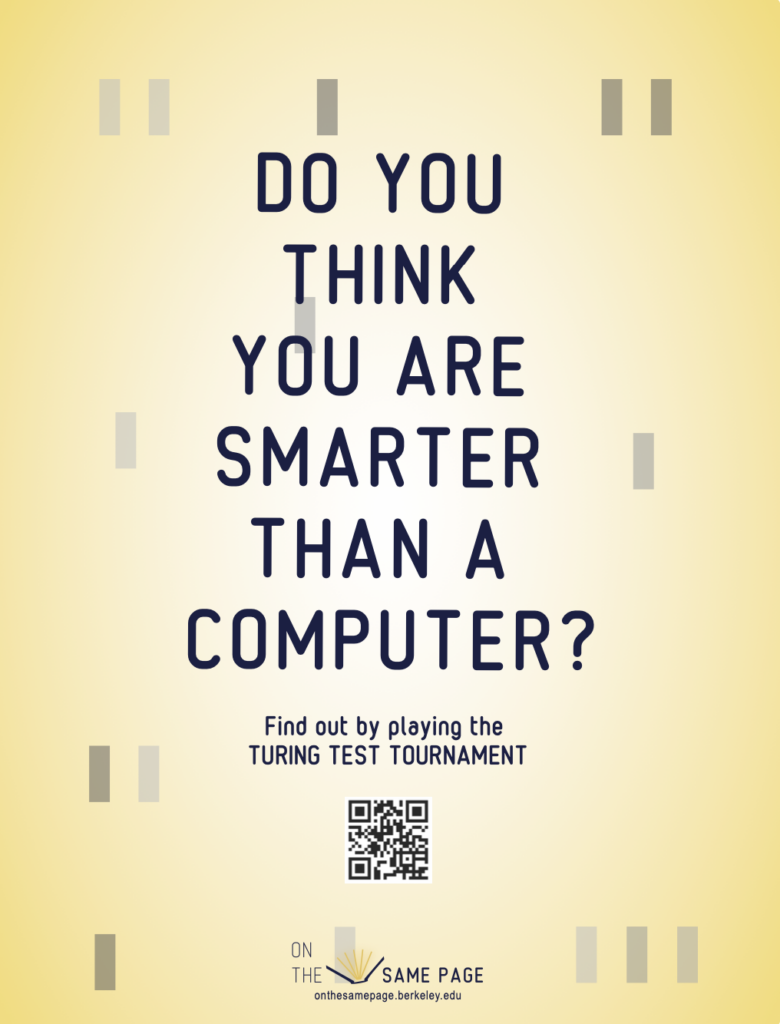
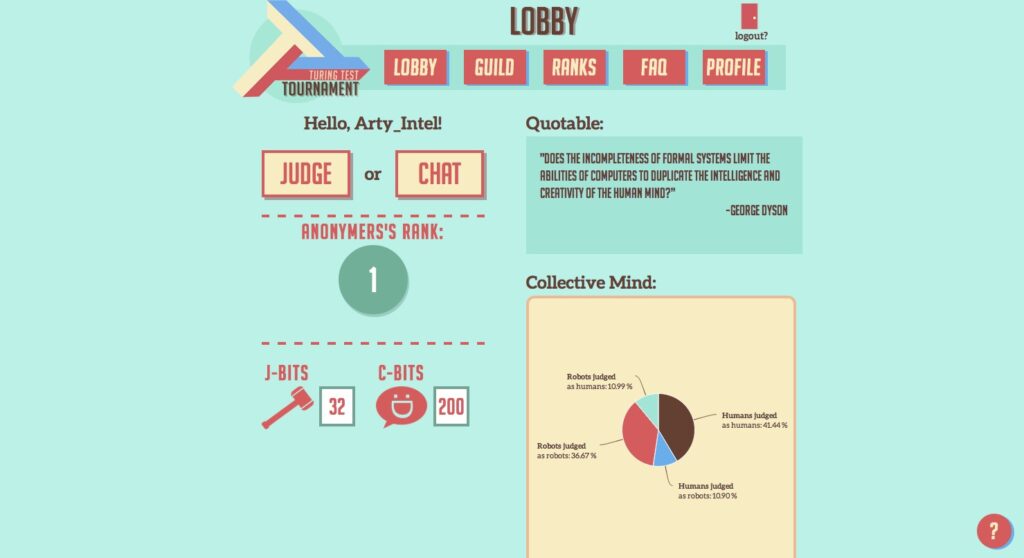
Social Annotation
Because our theme this year is the Dawn of the Computer Age, we wanted to give our students a way of interacting with the book that takes advantage of contemporary technology. We have partnered with MIT to offer you access to several chapters of Turing’s Cathedral online through a tool called NB, which allows you to highlight small sections of these chapters, comment on them, and comment on one another’s comments. Professor David Karger, who created NB, has written that “A strong motivation for our design of NB was the hypothesis that discussion can be improved if it is situated in the context of the document. Letting readers comment without leaving the reading environment meets the goals ofkeeping the user “in the flow” of their work, rather than interrupting it.” By participating in NB you will be helping him to prove or disprove this hypothesis, among others, for his research on social annotation and collaborative learning. Everyone on campus is invited to socially annotate this text on NB. Each of the chapters on NB will be curated by a faculty member or other interested party, so don’t be surprised if someone besides a fellow student comments on your notation! Our curators include Professor Ian Holmes, Professor Olga Holtz, Alvy Ray Smith (co-founder of Pixar), Professor Evan Variano, and the reader for L&S 10, Andrew David King. If you wish to socially annotate the text, email Alix Schwartz (alix@berkeley.edu).
Suggestions for Further Reading
A Madman Dreams of Turing Machines, Janna Levin. Alan Turing never met Kurt Godel, but their lives were in some ways parallel, as depicted in this slim novel by physicist Janna Levin.
Alan Turing: The Enigma (the Centenary Edition), Andrew Hodges (with forward by Douglas Hofstadter). This is considered the definitive biography of Alan Turing.
The Baroque Cycle, Neal Stephenson. This four-novel cycle blends threads of seventeenth-century Europe with the very first computers, developed by Leibniz and Newton.
Cryptonomicon, Neal Stephenson. Turing is a minor character in this cult favorite that moves effortlessly between World War II and a darkly imagined future.
The Dream Machine: J.C.R. Licklider and the Revolution that Made Computing Personal, M. Mitchell Wadrop. This history of personal computing begins in 1962, picking up the story shortly after Turing’s Cathedral leaves off.
Engines of Logic: Mathematicians and the Origin of the Computer, Martin Davis.This work traces the idea of the computer from Leibniz to von Neumann, giving readers a clear idea of how and why computers work.
Enigma, Robert Harris. This thriller, set in World War II, is based loosely on Turing’s work as a codebreaker. There is also a film version of this novel.
Logicomix: An Epic Search for Truth, Apostolos Doxiadis, Christos Papadimitriou, Alecos Papadatos, and Annie Di Donna. This graphic novel recounts philosopher Bertrand Russell’s quest for truth, and along the way conveys some of the most important ideas of mathematics and modern philosophy.
The Most Human Human, Brian Christian. Christian participated as a “confederate” in the 2009 Lobner Prize competition. In preparation for the competition he researched philosophy, psychology, linguistics and even dating manuals to try to pinpoint what separates humans from machines.
The Pattern on the Stone: The Simple Ideas that Make Computers Work,Daniel Hillis.This succinct work offers and easy-to-understand explanation of how computers work.
The Secret Lives of Codebreakers: The Men and Women Who Cracked the Enigma Code at Bletchley Park, Sinclair McKay. Bletchley Park was the secret headquarters for Great Britain’s codebreaking efforts in World War II. This book chronicles the day-to-day lives of the codebreakers, including Alan Turing, who cracked the Germans’ Enigma code, helping to win the war.
Turing: Pioneer of the Information Age, Jack Copeland. This is a short, highly accessible introduction to Turing and his work.
When Computers Were Human, by David Alan Grier: see this review about it in the Atlantic.
Suggestions for Your Viewing (and Listening) Pleasure
Check out this fun list of ten old movies that predicted new technologies — sometimes with impressive accuracy!
RadioLab on NPR did a great episode about Turing (thanks to new student Saam Barati for this one!).
Interested in Seeing Real-World Technical Innovations by Berkeley Students and Faculty?
Visit the Citris Tech Museum in Sutardja Dai Hall.
Online Resources
The Turing Archive for the History of Computing
The Computer History Museum (which you can also visit in person!)
Acknowledgments
Faculty Planning Committee
Henry Brady, Public Policy
Cathryn Carson, History
David Culler, Computer Science
Christopher Goetz, Berkeley Center for New Media
Tom Griffiths, Cognitive Science
Olga Holtz, Mathematics
Randy Katz, Computer Science
Antonio Montalban, Mathematics
Christos Papadimitriou, Computer Science
Alvy Ray Smith, co-founder of Pixar
Mark Richards, Earth & Planetary Science

